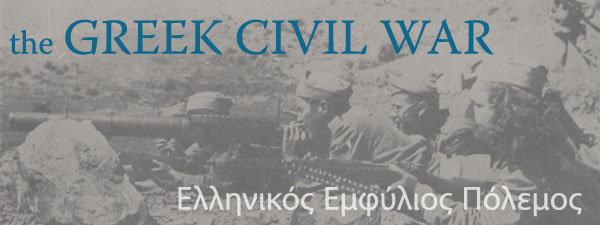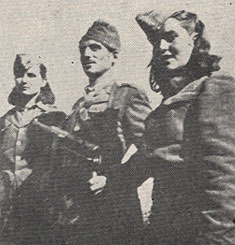
The guerilla army of ELAS (National People’s Army of Liberation) under the leadership of the KKE (Communist Party of Greece), led the resistance to Nazi occupation during the War. Inspired by the success of Tito’s partisan army in Yugoslavia, ELAS held two-thirds of the country in February 1945, at which time a truce was negotiated with the Royalists.

In October 1946, DSE (Democratic Army of Greece) launched a campaign to win control of the whole country, and received support from neighboring Yugoslavia, Albania and Bulgaria. Despite the presence of British troops and aid from the US, the Royalists were not expected to last long against the guerillas.
Citing the situation in Greece, the inability of the British to cope with the situation and alleged breaches of the Yalta Agreements in Romania, Poland and Bulgaria, US President Harry Truman launched the ‘Cold War’. Truman ultimately decided to break irrevocably from the alliance with Stalin formed during the Wold War II, terminating aid to the USSR and pledging significant monetary aid to the Royalists in Greece under the guise of the “Marshall plan.”

The initial efforts of DSE and affiliated groups were successful, although financial and materiel support from the U.S. and Britain changed the course of the war. Further, the premature tactical changes on the part of DSE as well as internal political upheaval and the withdrawal of support by neighboring Yugoslavia hastened the demise of the campaign. The KKE leadership made numerous political errors which compounded the problems faced by DSE on the battlefield. In October 1949, following the withdrawal of remaining DSE forces into Albania, a treaty was negotiated with the Royalists which signaled the end of the war.
The defeat of the communists during the civil war by no means resolved the class conflict in the country, and instead signalled the start of 25 years of repression: the KKE remained outlawed, communists continued to be persecuted and sent into labor camps, while their children were designated as “orphans” and sent to church schools for “re-education.” Although some who fled into Albania and neighboring areas were eventually allowed to return to Greece, the ethnic Macedonians (both guerillas and civilians) in Greece who were forced to flee their birthplaces to avoid the repression of the Greek government are still being denied re-entry into Greece to this day despite the fact that they are legally Greek citizens. These restrictions effectively culminate an extensive campaign of ethnic assimilation which has been implemented by the Greek ruling class. The ethnic Macedonians who fled Greece during the civil war period are the last ethnic-political refugees of the era, having withstood a period of exile spanning over half a century.
The hard right-wing officers of the counter-revolution were given the right to intervene in the political arena, founding organisations for “protection of the country against the communist threat.” This culminated in the 1967 coup and an ensuing 7-year right-wing dictatorship which was fostered by U.S. support. U.S. intervention in the country’s affairs continues in the present.
Documents
Before the War: 1940-1945
Open Letter of the General Secretary of the KKE Nikos Zachariadis (October 31, 1940)
The KKE had been banned in 1936 by the Metaxas regime. As such, much of the KKE leadership had been imprisoned by the onset of Italian aggression toward Greece. Zachariadis wrote this letter from jail, urging unity with the Metaxas government in efforts of defeating the common enemy of the Greek people.
The Last Great Speech of Aris Velouchiotis (1945)
Last Letter of Aris Velouhiotis to the Central Committee of the KKE (24 March 1945)
Velouchiotis was one of the leaders of Greek People's Liberation Army (ELAS) and a member of the Central Committee of the Communist Party of Greece.Following Greece's victory over the fascists at the end of World War II, he refused to surrender his weapons to the new government and returned to the mountains to organize a new revolutionary force. He was killed in battle with government forces shortly thereafter.
The Civil War: 1946-1949
Articles from Fourth International
Civil War in Greece (February 1945)
Greece (October 1945)
The Plebiscite in Greece (November 1946)

Gabriel's Cartoons from Daily Worker (1946)
Greek Chorus (March 12, 1946)
“…And don't send any wreaths…” (May 7, 1946)
Coming Back (September 3, 1946)
Bulletin of the American Council for a Democratic Greece
January 1947 (full document as 10.2 MB pdf)
Selected articles as HTML:
EAM Message
EAM Appeals to United Nations
Record of Greek Government
Guerilla Army Issues Communique

Murder Inc. in Greece (pamphlet) by Olive Sutton (April 1948)
Written prior to the critical events of 1949, this work by Olive Sutton casts a critical light on British and American intervention in Greece following the formulation and execution of the Truman Doctrine. Sutton's piece places special emphasis on the horrors of the "White Terror" in Greece, a period rife with the execution of political prisoners and the starvation and murder of many Greek civilians. Murder Inc. is indeed a candid chronicle of the marriage of imperialist intervention and capitalist exploitation in post-WWII Greece.
The Guerilla Struggle in Greece from Workers International News (June 1948)
Peace and Greece Ales Bebler (October 1948)
Speech of Dr. Ales Bebler, Deputy Minister of Foreign Affairs and Acting Chief of the Delegation of the F.P.R. of Yugoslavia to the Third Session of the General Assembly of the United Nations. Delivered before the First Committee of the General Assembly on October 27, 1948.
Speech at the Second Congress of the National Liberation Front Nikos Zachariadis (March 25, 1949)
Publications by the Unified Panhellenic Organisation of Youth (EPON)
Youth of Greece (1948) (download as 14 MB pdf)
The End of the War and Beyond
Reports from World News and Views
Two Sides in Greece (5 March 1949)
Tito Against the Peoples of Greece and Albania (27 August 1949)
Only a Democratic Peace for Greece! (29 October 1949)
Greece on Path to Open Dictatorship (January 21, 1950)
The ‘Abducted’ Greek Children (January 21, 1950)
Greece's “Independence Day” (March 25, 1950)
The Tito-Plastiras Wedding (May 13, 1950)
Supplemental Reading
Agis Stinas The Massacre of the Internationalist Communists in Greece, December 1944
Pierre Broué How Trotsky and the Trotskyists confronted the Second World War
Comments, contributions or questions are welcomed.
Contact this Archive's Administrators